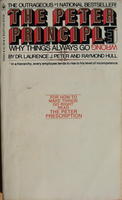
| Series: | Peter Principle #1 |
| Publisher: | Bantam |
| Copyright: | 1969 |
| Printing: | May 1972 |
| Format: | Mass market |
| Pages: | 169 |
The Peter Principle: In any hierarchy any employee tends to rise to their level of incompetence. The underlying explanation, which makes immediate intuitive sense to nearly everyone I've talked to about it, is that people are promoted for being good at their job. As long as they're doing a good job, they're eligible for promotion. Eventually, they're promoted into a job that they're incapable of doing, and then they no longer do a good enough job to get promoted. So there they stop, in the first job that's outside their level of competence.
This is the book that introduced that concept. I'd heard the concept many years ago, and have even used it as a tool to think about how I want to organize my career, but I'd never read the book about it. When I came into possession of a copy, I was curious enough to give it a try. (Besides, it's short and has frequent illustrations; it wasn't much of an investment.) Conclusion: Don't bother with it. All of the interesting content of the book is in the paragraph above.
First, the tone of the book is distinctly annoying. The conceit here is that Dr. Peter (his doctorate is in education) had piles of research and information about "hierarchiology," the study of hierarchies, but didn't have time to write this book, so Raymond Hull did it based on his notes. Like the many "case studies" in this book that are, if not entirely made up, at least highly exaggerated, I'm dubious. Certainly, though, the gung-ho, simplistic way in which ideas are presented here, the way that nearly every concept gets some name with "Peter" in it, and the gross simplifications, stereotypes, and false dichotomies would be distinctly out of place in any serious or thoughtful treatment. About the most the tone manages is to occasionally be funny, but even that gets repetitive after a while. It was also clearly written with the social outlook of the 1950s despite its 1969 publishing date; a certain annoying gender bias is one of several ways in which that shows painfully.
Second, the content is essentially an elaboration and repetition of the basic Peter Principle. There are a small handful of other ideas (use of creative incompetence to keep from being eligible for promotion, for instance), but that sort of moderately thoughtful elaboration is rare. Some lip service is given to discussing cases where the Peter Principle doesn't seem to apply, but none of that attention is serious. It always involves hand-waving and another sweeping generalization. I would be interested in a serious discussion of causes and effects of this tendency that discussed real exceptions and real countervailing forces. This book doesn't do that; it puts caricature and aphorism above thoughtful analysis wherever possible.
The frequent cartoons capture much of my feeling about the book. They're cartoons from Punch magazine with the original captions removed and something related to the book added instead. In a particularly odd choice, the original captions are all given in an appendix, so you can tell just how much better they were than the replacements. I found the originals occasionally worthy of a smile. The captions as presented in this book are not only warmed over repeats of something someone else did better, but are almost entirely devoid of humor. Most seemed to be trying far too hard to shoehorn something related to the text into images that were about something else entirely. (Of course, mileage may vary; humor is very individual.)
I think everyone should at least think about the Peter Principle. It's an intriguing piece to the overall picture of human behavior in workplaces and other hierarchies, and sharply critiques a model of career advancement that's still far too common. However, I don't think it explains incompetence of organizations in general; I'm more inclined towards analyses that show organizations are quite competent at behavior that is rewarded and what's normally broken is the reward structure. There are many other explanations for incompetence and some significant opposing forces to the Peter Principle that aren't mentioned here. It would be nice to have a book that tackles this with some thought. This, however, is not that book, and if its humor leaves you as cold as it did me, it's 170 pages that compress into two pages of content.
Followed by The Peter Prescription.
Reviewed: 2006-08-31